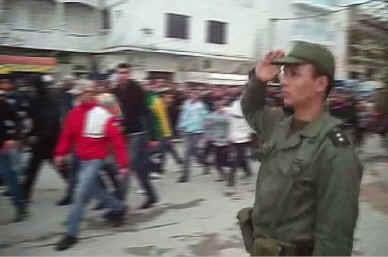
A Tunisian officer salutes the funeral of one of the protests' victims. Bizerte, Thursday. Source: nawaat.
In his speech to Tunisians last night, President Ben Ali went for double or quits. Either he has done enough to quell the protests with his offers to stand down in three years, to allow more freedom of expression (with qualifications) and to stop shooting demonstrators (again, with qualifications) or the game is lost. If it fails, he has only one card left: resignation.
Last night, drivers in Tunis could be heard hooting their horns in apparent approval of the president – though there were claims on Twitter that this was not spontaneous but orchestrated by the regime. On the plus side, internet censorship appeared to have been lifted, largely if not totally. On the minus side, there were reports of further shooting, even after the president had ordered it to stop.
This morning, the UGTT (the main trade union) is due to hold a general strike and demonstration in Tunis. It is expected that the ruling party will organise a counter-demonstration and the result could easily be a massive punch-up.
A BBC report says the "opposition" has (cautiously) welcomed the president's promises but opposition politicians are not the same as the protesters on the streets who may well have other ideas. Pledges, even when they are made on television, don't count for much in the Arab countries and ordinary folk treat them very cynically.
But let's suppose, for the sake of argument, that Ben Ali survives this weekend and buys some more time. What then?
First, Tunisia will not revert to what it was. People will be far more outspoken, less inhibited than they were before. The mainstream media may not change much (after all, some of them are owned by Ben Ali's family) but politics will have to open up.
That, in turn, means more danger for Ben Ali. He will obviously try to use the time he has bought to prepare the way for a successor of his own choosing, but it won't be plain sailing. He has made economic promises that he can't deliver and that could blow the whole thing off course.
Meanwhile, there is other unfinished business: calls for inquiries into the shootings, for example, and the promised investigation into corruption. Corruption is a major flashpoint, because there is no way it can be tackled credibly without arresting most of Ben Ali's family.
If he does survive the current uprising his future still looks pretty bleak. At best, he will be what we in the west call a lame duck leader – not at all what the situation demands.
At present, though, all that is still hypothetical. Which way it is going to go will be decided on the streets over the next few days. The ball is back in the protesters' court.
Posted by Brian Whitaker, 14 Jan 2011.

 RSS Feed
RSS Feed
